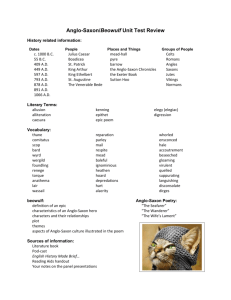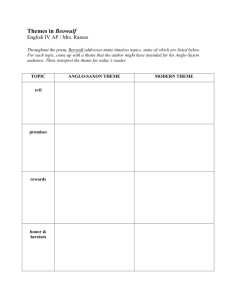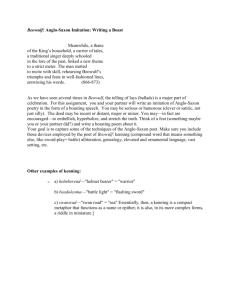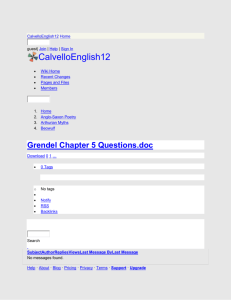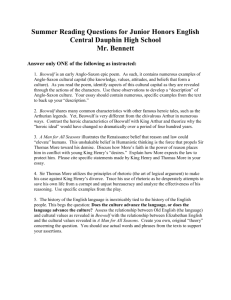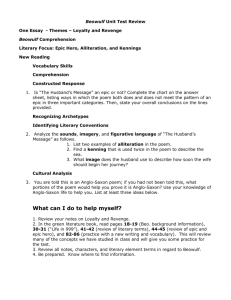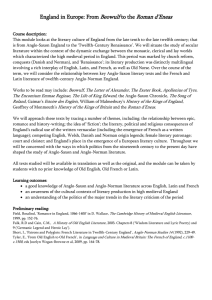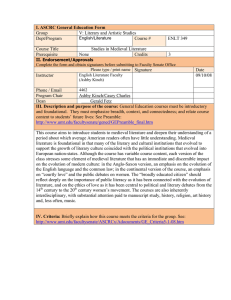ANGLO-SAXON
advertisement
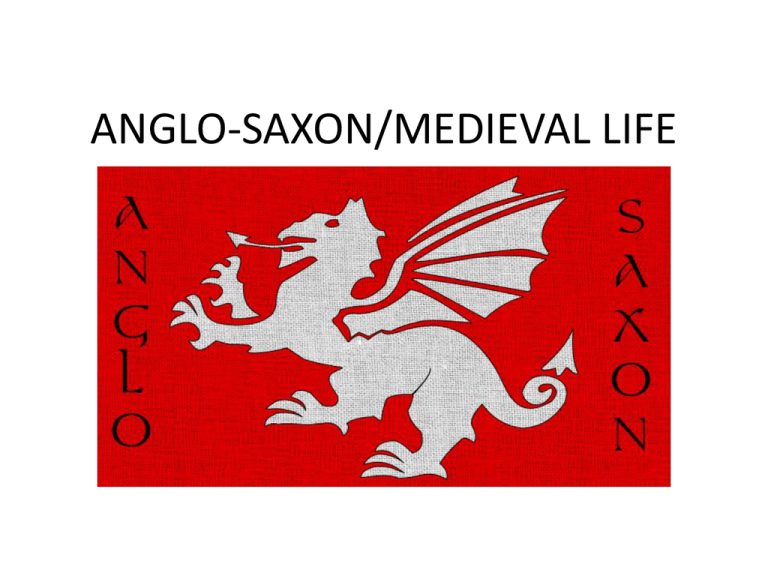
ANGLO-SAXON/MEDIEVAL LIFE Life, Religion, and History They were German settlers from Angeln and Saxony. They arrived around 410 AD…after the fall of the Roman Empire. The Jutes and the Frisians from Denmark also settled the British Isles at this time. Anglo-Saxon’s were Pagans- They did not believe in a Christian God. Life, Religion, and History There were some Christians. The descended from Roman Britains and were called Celts (K) Around 597 AD, the arrival of St. Augustine began the Christian revival and most of the country converts to Christianity. England was not a unified country as today. It consisted of Saxon, Angle, Briton, Kent, Merica, Northumbria, and Wessex. Life, Religion, and History Each Kingdom was organized as follows: King- He was the ruler. Thanes- The Noble Churls- Free peasants who owned land Slaves- They could be bought and sold. Eight oxen was a top price. Later, slaves could own land. Life, Religion, and History Wessex was the only kingdom to survive the Viking or Norsemen invasion around 789 AD. The Vikings, who were lead by Eric Bloodaxe, were defeated in 954 AD by an army from Wessex led by Alfred the Great, King of Wessex. Alfred the Great did many great things for England. To educate his people, he invited scholars from all over Europe to come and teach. Life, Religion, and History He ordered Monks to write Bibles and books in Anglo-Saxon language. He also established a universal set of laws for his country. He also devised a public hearing for those who broke the rules. If you did not show up, you could be killed by anyone. If you admitted a crime, you would have to pay a fine to the person you harmed. Life, Religion, and History Many aspects from the Anglo-Saxon era survive today. Our days of the week names come from the names of Anglo-Saxon gods. Tuesday- Tiw, god of war Wednesday- Woden, chief Teutonic god Thursday- Thor, god of thunder Friday- Frigga, goddess of home Literary Terms for Beowulf Epic- a long, serious poem. Usually describes bravery in battle and resourcefulness during a long journey. Usually centers on a national hero, his courage, intelligence, and most importantly, his goodness. Theme- the central idea of a literary work. Literary Terms for Beowulf Alliteration- the repetition of the same sound at the beginning of closely linked words or syllables. Ex. “With a rush and a roar, the ruthless rocks rebounded.” Metaphor- a comparison of two unlike things not usually thought of as being alike. EX. Snake in the grass – unseen, strike anytime Literary Terms for Beowulf Personification- giving human qualities to objects or abstract ideas. EX. “The tree wrapped it’s branches around the small child.” Simile- the comparison of two unlike things using either “like” or “as”. EX. Fast as a cheetah Narrative Poem- a poem that tells a story Literary Terms for Beowulf Onomatopoeia- words who’s sounds suggest their meaning. EX. Snap, crackle, pop Symbol- something that stands for something else. EX. The American Flag Literary Terms for Beowulf Kenning- a poetic device characteristic of the Anglo-Saxon period. They are used to signify a person or thing by a characteristic or quality. EX. Whale road = the sea

